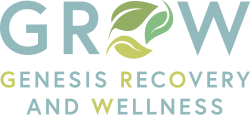Transitioning from the initial stages of treatment, like detox or inpatient treatment, to outpatient services, the risk of relapse is higher. Clients are especially vulnerable in this stage of recovery because they may face new challenges or obstacles that put their sobriety at risk. At Genesis Recovery and Wellness (GROW), we aim to help our clients heal and learn how to live a fulfilling, healthy life free of substances. Our clients learn techniques for how to prevent relapse and ways to maintain their recovery effectively. At GROW, we offer relapse prevention therapy where our clients learn important tips to avoid relapse.
5 Tips for Preventing Relapse
1. Identify Your Triggers
A trigger is an internal or external stimulus that can increase the urge to abuse substances again. Identifying and understanding your triggers is one of the most critical tips for preventing relapse. Some common triggers include:
- Feelings of boredom
- Loneliness
- Certain relationships
- Specific places
- Stress
- Irritability
- Low self-esteem
- Times of celebration
Knowing your triggers can help a person in recovery maintain healthy habits and engage in positive behavior that does not put their sobriety at risk. Increasing self-awareness about the things that increase the risk of relapse is essential for avoiding past bad habits and behavior.
2. Develop Healthy Coping Strategies to Deal with Stress and Triggers
The next essential tip to avoid a relapse is learning healthy coping mechanisms when stressors and triggers arise. It is not just crucial to know what your triggers are but also healthy ways to deal with them. Some strategies include mindfulness meditation, deep breathing exercises, exercising, or attending support groups. Finding strategies that work for you can help you maintain long-term recovery even when challenges and stressors occur.
3. Reconnect with Old Hobbies or Explore New Ones
Addiction takes away a lot from a person’s life. One common symptom and sign of addiction is a lack of interest in hobbies or things they used to enjoy. Staying busy with past times you enjoy, whether this is a past hobby or a new one, is another important tip for how to avoid relapse. Positive hobbies like reading, baking, crafts, or a sports league can help keep people occupied and decrease the desire to abuse substances.
4. Build a Healthy Support System
Surrounding yourself with a positive and healthy support system is critical for avoiding relapse. At Genesis Recovery and Wellness, a client can learn effective communication skills and ways to improve or rebuild relationships harmed by addiction. A healthy support system can include family, friends, sober peers, or support group members. Having people in your life who have a positive impact and will support your recovery will greatly lower the risk of relapse.
5. Take Care of Your Physical and Mental Health
Addiction takes a serious toll on a person’s physical and mental health. Staying healthy physically and mentally is critical for long-term recovery and is an important tip to prevent relapse. Many turn to substance abuse because of poor mental health, so taking care of your mental health can help you avoid relapse. Things like routine exercise, eating healthy, getting enough sleep, and attending therapy sessions can significantly impact recovery and improve your health and well-being.
Relapse Prevention Therapy at Genesis Recovery and Wellness
We understand that treatment and recovery can be difficult at Genesis Recovery and Wellness. Once treatment is over, the transition to maintaining recovery can present new challenges. Through our relapse prevention therapy, we provide tips for preventing relapse by helping our clients live healthy, fulfilling lives. If you or someone you know is struggling with addiction, reach out to GROW at 216.331.2998.

